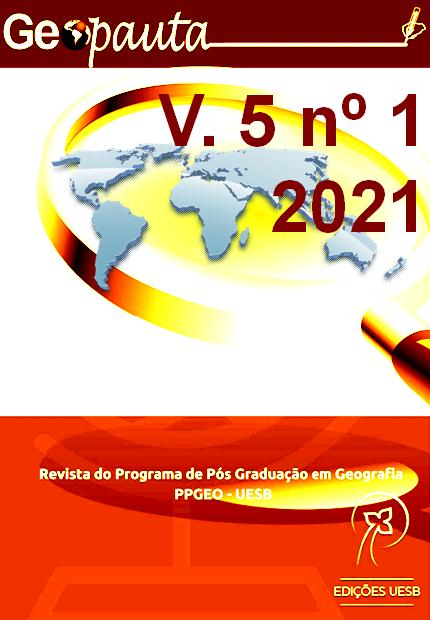The multiculturalist paradigm and the ethnopolitical protagonism of indigenous communities: A contemporary and critical geographical perspective of the issue
DOI:
https://doi.org/10.22481/rg.v5i1.6504Keywords:
Multiculturalism, ethnopolitical protagonism, indigenous communitiesAbstract
This paper aims to establish a reflection on the influence of the emergence of the multiculturalist paradigm on the observed ethnopolitical role of indigenous communities in contemporary times. To this, it presents a bibliographic analysis about the concepts of ethnic pluralism, multiculturalism, new environmentalism and socio-environmentalism that, in a historical perspective, contributed to the formation of a favorable context for the performance of ethnic movements, among which those related to indigenous peoples stand out, which, on the other hand, served to stimulate and boost cultural studies within the scope of Geography.
Downloads
Metrics
References
ACSELRAD, H.. Justiça ambiental - ação coletiva e estratégias argumentativas. In: _____. Conflitos ambientais no Brasil. Rio de Janeiro: Relume Dumará: Fundação Heinrich Boll, 2004. p. 7-12.
AMORIM FILHO, O. B.. Topofilia, Topofobia e Topocídio em Minas Gerais. In: DEL RIO, V.; OLIVEIRA, L.. Percepção Ambiental: A experiência brasileira. São Paulo: UFSCar/Studio Nobel, 1999, 2ª ed. p. 139-152.
BARBIERI, E.. Biodiversidade: capitalismo verde ou ecologia social? Editora Cidade Nova, 1998.
BASSO, J.. O direito às terras indígenas e o multiculturalismo como bases para a sustentabilidade. Revista de Estudos Sociais, v. 17, n. 34, 2015.
BULLARD, R. D.. A anatomia do racismo ambiental e o movimento por justiça ambiental. In: IBASE. Movimento Sindical e Defesa do Meio Ambiente: o debate internacional. Rio de Janeiro: Arte Maior, 2000, p. 32-41. Série Sindicalismo e Justiça Ambiental, vol. 3.
COGO, D.. Multiculturalismo, comunicação e interculturalidade: cenários e itinerários conceituais. In: PERUZZO, C. M. K.; PINHO, J. B.. Comunicação e Multiculturalismo. São Paulo: INTERCOM, Manaus: Universidade do Amazonas, 2001. p. 13-45.
COSTA, B. P.; NASCIMENTO, T. F.. Fenomenologia e geografia: teorias e reflexões. Geografia, Ensino & Pesquisa, vol. 20, n.3, p. 43-50, 2016.
D’ADESKY, J.. Pluralismo étnico e multiculturalismo. Afro-Ásia, 19/20, 1997. p. 165-182. Disponível in: <https://portalseer.ufba.br/index.php/afroasia/article/download/20952/13555> Acesso em 05 de abril de 2018.
DEUS, J. A. S.; CASTRO, H. M.. Um olhar etnogeográfico sobre as paisagens culturais barrocas do hinterland brasileiro na(s) minas oitocentista(s). XII EGAL (Encontro de Geógrafos da América Latina), 2009. Disponível in: <http://observatoriogeograficoamericalatina.org.mx/egal12/Ensenanzadelageografia/Investigacionydesarrolloeducativo/16.pdf> Acesso em 05 de abril de 2018.
DEUS, J. A. S.. Paisagens Culturais Alternativas e Protagonismo Etnopolítico de Comunidades Tradicionais no Hinterland Brasileiro. In: TUBALDINI, M. A. S.; GIANASI, L. M.. Agricultura Familiar, Cultura Camponesa e Novas Territorialidades no Vale do Jequitinhonha: Gênero, Biodiversidade, Patrimônio Rural, Artesanato e Agroecologia. Belo Horizonte: Fino Traço Editora, 2012, p. 35-50.
DIAS NETO, J.. Aqui e Lá: Olhares e fronteiras entre a comunidade indígena Pataxó e a sociedade envolvente no município de Carmésia/MG. Dissertação de mestrado apresentada ao Programa de Pós-Graduação em Geografia da Universidade Federal de Minas Gerais/Instituto de Geociências (IGC), 2019. 334 p.
DIAS, G. V.; TOSTES, J. G. R.. Desenvolvimento sustentável: do ecodesenvolvimento ao capitalismo verde. Revista da Sociedade Brasileira de Geografia, v. 2, n. 2, p. 2007-2009, 2009. Disponível em: <https://www.researchgate.net/profile/Guilherme_Dias14/publication/266485934_Desenvolvimento_sustentavel_do_ecodesenvolvimento_ao_capitalismo_verde/links/5955057c458515bbaa21e4da/Desenvolvimento-sustentavel-do-ecodesenvolvimento-ao-capitalismo-verde.pdf> Acesso em 04 de dezembro de 2018.
GOMES, A. K.. Direitos Humanos e Multiculturalismo. Revista Eletrônica da Faculdade de Direito de Franca, v. 3, n. 1, 2010. Disponível em: <http://revista.direitofranca.br/index.php/refdf/article/view/99> Acesso em 12 de abril de 2018.
HOGAN, D.. População e Meio Ambiente. Textos NEPO 16. Núcleo de Estudos de População, Universidade Estadual de Campinas - UNICAMP, Campinas, São Paulo, 1989.
INSTITUTO SOCIOAMBIENTAL (ISA). Convenção 169 da OIT é instrumento para enfrentar violação de direitos. Disponível em: <https://www.socioambiental.org/pt-br/noticias-socioambientais/convencao-169-da-oit-e-instrumento-para-enfrentar-violacao-de-direitos> Acesso em 20 de setembro de 2017.
INSTITUTO SOCIOAMBIENTAL (ISA). Panará. Disponível em: <https://pib.socioambiental.org/pt/Povo:Panar%C3%A1> Acesso em 04 de dezembro de 2018.
INSTITUTO SOCIOAMBIENTAL (ISA). Puruborá. Disponível em: <https://pib.socioambiental.org/pt/Povo:Purubor%C3%A1> Acesso em 11 de abril de 2020.
IORIS, R. R.. Culturas em choque: a globalização e os desafios para a convivência multicultural. São Paulo: Annablume, 2007. 103 p.
OLIVEIRA, R. C.. Caminhos da identidade: ensaios sobre etnicidade e multiculturalismo. São Paulo: Editora UNESP, 2006. 258 p.
PAULA, E. A.; MORAIS, M. J.. O conflito está no ar: povos da floresta e espoliação sob o capitalismo verde. Estudos de Sociologia, v. 18, n. 35, 2013. Disponível em: <https://periodicos.fclar.unesp.br/estudos/article/view/6458> Acesso em 04 de dezembro de 2018.
RIBEIRO, D.. Os índios e a civilização: a integração das populações indígenas no Brasil moderno. São Paulo: Companhia das Letras, 1996.
TORRES, C. A.. Introdução: as aventuras secretas da ordem. In: TORRES, C. A. Democracia, Educação e Multiculturalismo: dilemas da cidadania em um mundo globalizado. Petrópolis: Editora Vozes, 2001. p. 13-20.
Downloads
Published
How to Cite
Issue
Section
License
Copyright (c) 2021 from the Geopauta Journal and the Author(s)

This work is licensed under a Creative Commons Attribution 4.0 International License.
Copyright
Authors must retain unrestricted copyright and grant the Geopauta the first publication with the work simultaneously licensed under CC BY which allows others to share with recognition of each author's authorship in the initial publication in this Journal
Intellectual Property and Terms of Use
Geopauta adopts the Free Access policy in accordance with Open Access - OAC recommended by DOAJ and in accordance with the SciELO Criteria, under a Creative Commons CC By Attribution 4.0 International License, allowing immediate free access to the work and allowing any user to read, download, copy, distribute, print, search or link to the full texts of the articles, track them for indexing, pass them as data to software or use them for any other legal purpose.
Geopauta attributes the CC BY. license. where it is allowed without restrictions:
Share — copy and redistribute the material in any medium or format for any purpose, even commercial. as long as they give due credit for the original creation.
Adapt — remix, transform, and create from the material for any purpose, even commercial purposes, as long as due credit is given for the original creation.












